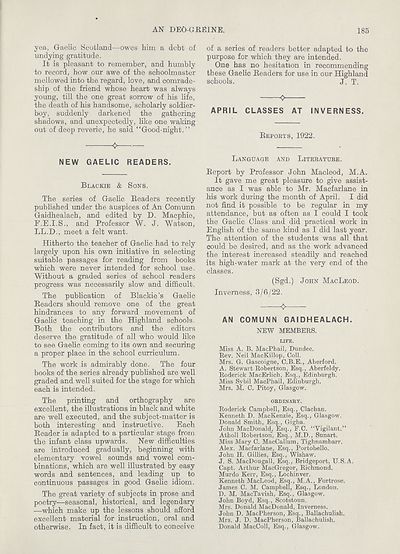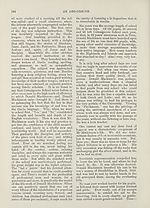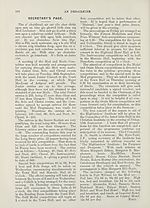An Comunn Gàidhealach Publications > Deo-gréine > Volume 17, October 1921 to September 1922
(193) Page 185
Download files
Complete book:
Individual page:
Thumbnail gallery: Grid view | List view

AN DEO-GHEINE.
185
yea, Gaelic Scotland—owes him a debt of
undying gratitude.
It is pleasant to remember, and humbly
to record, how our awe of the schoolmaster
mellowed into the regard, love, and comrade¬
ship of the friend whose heart was always
young, till the one great sorrow of his life,
the death of his handsome, scholarly soldier-
boy, suddenly darkened the gathering
shadows, and unexpectedly, like one waking
out of deep reverie, he said “Good-night.”
0
NEW GAELIC READERS.
Blackie & Sons.
The series of Gaelic Readers recently
published under the auspices of An Comunn
Gaidhealach, and edited by D. Macphie,
F.E.I.S., and Professor W. J. Watson,
LL.D., meet a felt want.
Hitherto the teacher of Gaelic had to rely
largely upon his own initiative in selecting
suitable passages for reading from books
which were never intended for school use.
Without a graded series of school readers
progress was necessarily slow and difficult.
The publication of Blackie’s Gaelic
Readers should remove one of the great
hindrances to any forward movement of
Gaelic teaching in the Highland schools.
Both the contributors and the editors
deserve the gratitude of all who would like
to see Gaelic coming to its own and securing
a proper place in the school curriculum.
The work is admirably done. The four
books of the series already published are well
graded and well suited for the stage for which
each is intended.
The printing and orthography are
excellent, the illustrations in black and white
are well executed, and the subject-matter is
both interesting and instructive. Each
Reader is adapted to a particular stage from
the infant class upwards. New difficulties
are introduced gradually, beginning with
elementary vowel sounds and vowel com¬
binations, which are well illustrated by easy
words and sentences, and leading up to
continuous passages in good Gaelic idiom.
The great variety of subjects in prose and
poetry—seasonal, historical, and legendary
—which make up the lessons should afford
excellent material for instruction, oral and
otherwise. In fact, it is difficult to conceive
of a series of readers better adapted to the
purpose for which they are intended.
One has no hesitation in recommending
these Gaelic Readers for use in our Highland
schools. J. T.
APRIL CLASSES AT INVERNESS.
Reports, 1922.
Language and Literature.
Report by Professor John Macleod, M.A.
It gave me great pleasure to give assist¬
ance as I was able to Mr. Macfarlane in
his work during the month of April. I did
not find it possible to be regular in my
attendance, but as often as I could I took
the Gaelic Class and did practical work in
English of the same kind as I did last year.
The attention of the students was all that
could be desired, and as the work advanced
the interest increased steadily and reached
its high-water mark at the very end of the
classes.
(Sgd.) John MacLeod.
Inverness, 3/6/22.
AN COMUNN GAIDHEALACH.
NEW MEMBERS.
LIFE.
Miss A. B. MacPhail, Dundee.
Rev. Neil MacKillop, Coll.
Mrs. G. Gascoigne, C.B.E., Aberford.
A. Stewart Robertson, Esq., Aberfeldy.
Roderick MacErlich, Esq., Edinburgh.
Miss Sybil MacPhail, Edinburgh.
Mrs. M. C. Pitoy, Glasgow.
ordinary.
Roderick Campbell, Esq., Clachan.
Kenneth D. MacKenzie, Esq., Glasgow.
Donald Smith, Esq., Gigha.
John MacDonald^ Esq., F.C. “Vigilant.”
Atholl Robertson, Esq., M.D., Sunart.
Miss Mary C. MacCallum, Tighnambarr.
Alex. Macfarlane, Esq., Portobello.
John H. Gillies, Esq., Wishaw.
J. S. MacDougall, Esq., Bridgeport, U.S.A.
Capt. Arthur MacGregor, Richmond.
Murdo Kerr, Esq., Lochinver.
Kenneth MacLeod, Esq., M.A., Fortrose.
James C. M. Campbell, Esq., London.
D. M. MacTavish, Esq., Glasgow.
John Boyd, Esq., Scotstoun.
Mrs. Donald MacDonald, Inverness.
John D. MacPherson, Esq., Ballachulish.
Mrs. J. D. MacPherson, Ballachulish.
Donald MacColl, Esq., Glasgow.
185
yea, Gaelic Scotland—owes him a debt of
undying gratitude.
It is pleasant to remember, and humbly
to record, how our awe of the schoolmaster
mellowed into the regard, love, and comrade¬
ship of the friend whose heart was always
young, till the one great sorrow of his life,
the death of his handsome, scholarly soldier-
boy, suddenly darkened the gathering
shadows, and unexpectedly, like one waking
out of deep reverie, he said “Good-night.”
0
NEW GAELIC READERS.
Blackie & Sons.
The series of Gaelic Readers recently
published under the auspices of An Comunn
Gaidhealach, and edited by D. Macphie,
F.E.I.S., and Professor W. J. Watson,
LL.D., meet a felt want.
Hitherto the teacher of Gaelic had to rely
largely upon his own initiative in selecting
suitable passages for reading from books
which were never intended for school use.
Without a graded series of school readers
progress was necessarily slow and difficult.
The publication of Blackie’s Gaelic
Readers should remove one of the great
hindrances to any forward movement of
Gaelic teaching in the Highland schools.
Both the contributors and the editors
deserve the gratitude of all who would like
to see Gaelic coming to its own and securing
a proper place in the school curriculum.
The work is admirably done. The four
books of the series already published are well
graded and well suited for the stage for which
each is intended.
The printing and orthography are
excellent, the illustrations in black and white
are well executed, and the subject-matter is
both interesting and instructive. Each
Reader is adapted to a particular stage from
the infant class upwards. New difficulties
are introduced gradually, beginning with
elementary vowel sounds and vowel com¬
binations, which are well illustrated by easy
words and sentences, and leading up to
continuous passages in good Gaelic idiom.
The great variety of subjects in prose and
poetry—seasonal, historical, and legendary
—which make up the lessons should afford
excellent material for instruction, oral and
otherwise. In fact, it is difficult to conceive
of a series of readers better adapted to the
purpose for which they are intended.
One has no hesitation in recommending
these Gaelic Readers for use in our Highland
schools. J. T.
APRIL CLASSES AT INVERNESS.
Reports, 1922.
Language and Literature.
Report by Professor John Macleod, M.A.
It gave me great pleasure to give assist¬
ance as I was able to Mr. Macfarlane in
his work during the month of April. I did
not find it possible to be regular in my
attendance, but as often as I could I took
the Gaelic Class and did practical work in
English of the same kind as I did last year.
The attention of the students was all that
could be desired, and as the work advanced
the interest increased steadily and reached
its high-water mark at the very end of the
classes.
(Sgd.) John MacLeod.
Inverness, 3/6/22.
AN COMUNN GAIDHEALACH.
NEW MEMBERS.
LIFE.
Miss A. B. MacPhail, Dundee.
Rev. Neil MacKillop, Coll.
Mrs. G. Gascoigne, C.B.E., Aberford.
A. Stewart Robertson, Esq., Aberfeldy.
Roderick MacErlich, Esq., Edinburgh.
Miss Sybil MacPhail, Edinburgh.
Mrs. M. C. Pitoy, Glasgow.
ordinary.
Roderick Campbell, Esq., Clachan.
Kenneth D. MacKenzie, Esq., Glasgow.
Donald Smith, Esq., Gigha.
John MacDonald^ Esq., F.C. “Vigilant.”
Atholl Robertson, Esq., M.D., Sunart.
Miss Mary C. MacCallum, Tighnambarr.
Alex. Macfarlane, Esq., Portobello.
John H. Gillies, Esq., Wishaw.
J. S. MacDougall, Esq., Bridgeport, U.S.A.
Capt. Arthur MacGregor, Richmond.
Murdo Kerr, Esq., Lochinver.
Kenneth MacLeod, Esq., M.A., Fortrose.
James C. M. Campbell, Esq., London.
D. M. MacTavish, Esq., Glasgow.
John Boyd, Esq., Scotstoun.
Mrs. Donald MacDonald, Inverness.
John D. MacPherson, Esq., Ballachulish.
Mrs. J. D. MacPherson, Ballachulish.
Donald MacColl, Esq., Glasgow.
Set display mode to:
![]() Universal Viewer |
Universal Viewer | ![]() Mirador |
Large image | Transcription
Mirador |
Large image | Transcription
| An Comunn Gàidhealach > An Comunn Gàidhealach Publications > Deo-gréine > Volume 17, October 1921 to September 1922 > (193) Page 185 |
|---|
| Permanent URL | https://digital.nls.uk/127172289 |
|---|
| Description | Leabhar 17, Treasamh Mios an Fhoghair 1921 gu Dara Mìos an Fhoghair 1922 |
|---|---|
| Attribution and copyright: |
|
| Description | This contains items published by An Comunn, which are not specifically Mòd-related. It includes journals, annual reports and corporate documents, policy statements, educational resources and published plays and literature. It is arranged alphabetically by title. |
|---|
| Description | A collection of over 400 items published by An Comunn Gàidhealach, the organisation which promotes Gaelic language and culture and organises the Royal National Mòd. Dating from 1891 up to the present day, the collection includes journals and newspapers, annual reports, educational materials, national Mòd programmes, published Mòd literature and music. |
|---|---|
| Additional NLS resources: |
|

